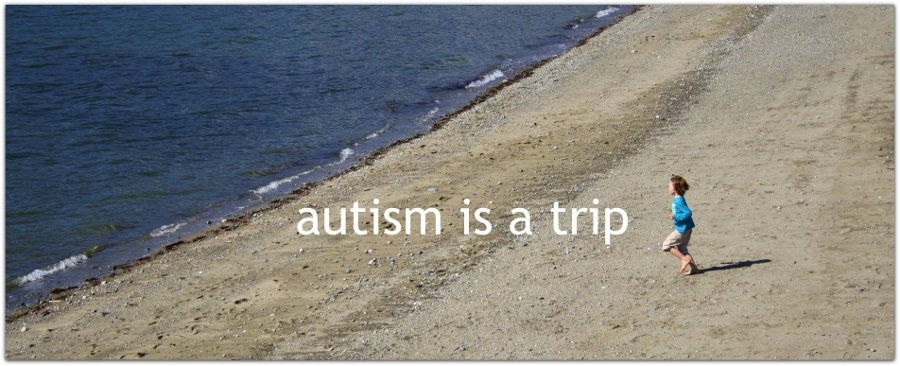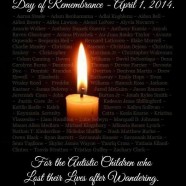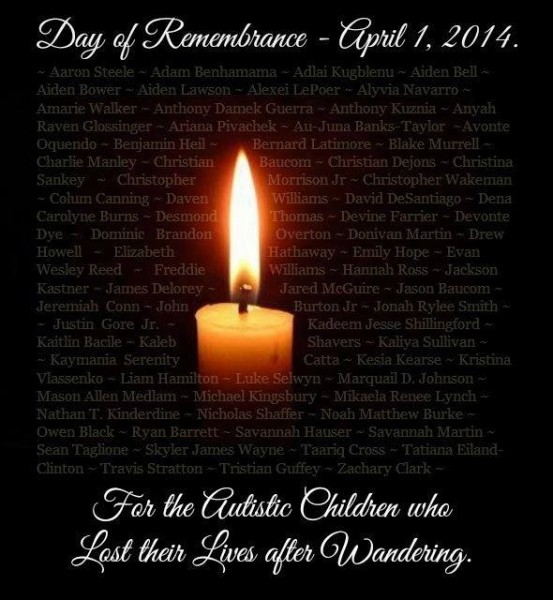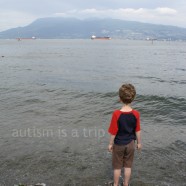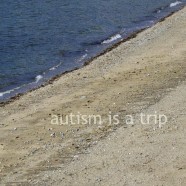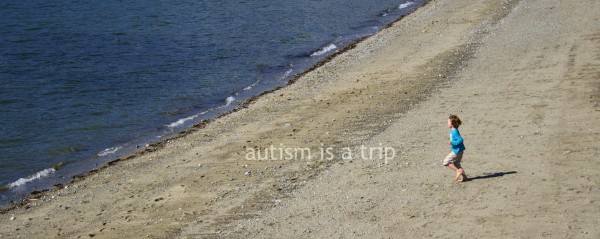Autistic Wandering is No Joke
Every year, almost half of all children with autism attempt to escape, or elope, from a safe environment. Too many of them never make it home.
Today, April 1, 2014, we pause to remember those we have lost to wandering.
From the Facebook event description:
“This event is a virtual candlelight vigil to remember and respect the lives of autistic children who have died after an elopement.
The Kennedy Krieger Institute reported in a 2011 study that up to 48% of all children with autism will engage in wandering behavior or “elopement,” which is defined as the tendency to leave a non life threatening space and enter into a potentially dangerous one, and is a rate 4 times higher than their neurotypical siblings.
The Krieger Institute also reported that “35% of families with children who elope report their children are “never” or “rarely” able to communicate their name, address, or phone number by any means.”
In 2012, the National Autism Association reported that “accidental drowning accounted for 91% total U.S. deaths reported in children with an ASD ages 14 and younger subsequent to wandering/elopement.”
This vigil is being organized to spread awareness of the very real issue of wandering behavior in autistic children and the unspeakable tragedies that can, and have occurred as a result.
Please join us in respectful remembrance of the children who have died.
For additional resources check the website: http://www.awaare.org/
Or find them on facebook: NAA Autism & Safety: Wandering Prevention”
This is by no means a comprehensive list of every child and individual lost to wandering, but it is entirely too long already. Please, do your part to help make sure we don’t have to add more names next year.
Kaitlin Bacile
Au-Juna Banks-Taylor, age 9
Ryan Barrett
Christian Baucom, age 6
Jason Baucom
Adam Benhamama
Owen Black, age 7
Aiden Bower, age 4
Ashley Brock
Noah Burke
Carolyne Burns
Dena Burns, age 6
John Burton Jr., age 7
Colum Canning
Kaymania Catt, age 5
Alex Christopher, 6/3/05
Zachary Clark
Jeremiah Conn, age 6
Holden Cottingham, 2013
Taariq Cross, age 7
Christian Dejons
James Delorey
David DeSantiago, age 11
Devonte Dye, age 5
Tatiana Eiland-Clinton, age 3
Devine Farrier
Justin Gore, Jr.
Darryl Gosein
Anthony Guerra, age 9
Tristian Guffey
Liam Hamilton, age 7
Elizabeth Hathaway, age 10
Savannah Hauser
Benjy Heil
Jack Hensley
Emily Hope
Drew Howell, age 2
Tristin Jeras, 7/26/12
Aiden Johnson
Marquail Johnson, age 8
Jackson Kastner, age 4
Kesia Kearse
Nathan Kinderdine
Michael Kingsbury, age 7
Adlai Kugblenu
Anthony Kuznia, age 11
Bernard Latimore
Aiden Lawson, age 3
Kieran le Couteur
Erik Lippmann
Alexie Loper, age 4
Mikaela Lynch, 5/15/13
Charlie Manley, age 16
Savannah Martin, 2/20/11
Donivan Martin, age 16
Savannah Martin, age 7
Jason McGuire
Mason Medlam
Logan Mitcheltree
Christopher Morrison, age 5
Blake Murrell, age 4
Alyvia Navarro, age 3
Avonte Oquendo, age 14
Dominic Overton
Ariana Pivacheck, age 9
Evan Reed, 2012
Hannah Ross, age 7
Blake Ryan, 4/19/11, age 4
Christina Sankey, age 29
Luke Selwyn
Nicholas Shaffer, age 12
Kaleb Shavers, age 6
Kadeem Shillingford, age 15
Jonah Smith
Julian Stacey, New Zealand
Travis Stratton, 3/1/14, age 4
Kaliya Sullivan
Sean Taglione, 1/29/12, age 12
Desmond Thomas
Kristina Vlassenko, age 10
Christopher Wakeman, age 23
Amarie Walker, age 4
Skylar Wayne
Freddie Williams, age 13
Davin Williams, age 15
NNR, age 5, Bradenton, FL
NNR, age 11, Stafford, VA
NNR, age 12, Houston, TX
Why Didn’t Mikaela Lynch Get an Amber Alert?
I also blog over at redOrbit.com, and this was my other post as part of “An Outpouring of Love for The Mikaela Lynch Family.” To read more entries from other writers, please visit this site. You can see the original post here. Sadly, several more autistic children have drowned since I wrote this article not two weeks ago.
******************************************************************************************
There is a question many are asking in the wake of Mikaela Lynch‘s disappearance in Clearwater, CA last week. Actually, there are a lot of questions being asked by a lot of people, but there is one that I, and many in the autism community, would really like an answer to.
Why was there no Amber Alert for this missing nine-year-old girl?
It’s important to understand that not all missing children get an Amber Alert issued for them. In order to “qualify,” missing children must fit certain criteria. Primarily, the family must be able to prove the child was abducted, and preferably give a description of the abductor and/or their vehicle.
A missing autistic child does not fit the criteria for an Amber Alert, yet the dangers are just as real and just as imminent as for one who has been abducted.
Over half of all autistic children are “runners”: children who, given the chance or the right circumstances, will simply go. Take off. Run. Sometimes there is a destination, oftentimes there is not. My child runs when he doesn’t want to leave somewhere or when he’s off in “his world,” as we call it. He gives us very few clues as to where and when it might happen, so we are always wary. It doesn’t happen very often with him, but many autistic children are continuous flight risks, meaning their families are on high alert at all times, day and night. Their houses are fortresses of locks and gates and barriers and alarms.
Another curious thing about autistic children? They’re fast. Faster than you’d ever think, and highly trained in the arts of evasion. If an autistic child wants to run and you’re not ready for it, there’s not a whole lot you can do other than hope you can run faster. Or hope there’s someone on the other end who can run interference. A lot depends on hope.
Mikaela was nonverbal. She could not speak, nor really understand the world around her past the cognizance level of a very young toddler. Mikaela was also not toilet trained. That’s not unusual for children on certain parts of the autism spectrum, nor is it a surprise to anyone who has an autistic family member or knowledge of autism. Autism parents talk about speech competence and toilet habits in the same breath. It’s just another part of life. And no, it doesn’t matter if she was or was not able to use the toilet herself, but it speaks to her vulnerability. It’s not newsworthy in any kind of sensational way.
Autistic children are barraged with sensory input, and are equally drawn to things that stand out to them. Mikaela, like many children, loved water. Given the chance, she went to the water. Mikaela had sensory issues with her clothing – typical among individuals on the spectrum – and liked to shed it when she was hot. Within minutes of leaving her home, she was naked. A naked nine-year-old girl, running down the street, headed for water.
I cannot imagine putting a child in a more vulnerable situation.
Knowing these things about Mikaela, it becomes a little easier to see why she may have taken off in such a hurried manner. How often do parents find themselves chasing toddlers who have run off after a butterfly or a car or a cloud? Who strip naked at the drop of a hat? Small children are amazed with the world, and they want to embrace it. Individuals with autism experience the world much in the same way. To them, everything is bigger and louder and brighter and more extreme (this is an excellent video that attempts to replicate how an autistic person experiences their environment).
Autistic children with a high-risk of eloping (running) can be fitted with a tracking anklet or GPS tracking device in their school bag (there are bracelets and watches, too, but those can be torn off by an extremely sensitive individual). There is an endless array of identification items for autistic children, everything from temporary tattoos to shoe ID tags. We’ve even resorted to writing our phone number on Jack’s upper arm where he can’t rub it off.
The majority of us in the autism community don’t need to ask what security measures Mikaela’s parents had in place to keep her contained and out of harm’s way. We can safely assume, knowing her abilities and cognizance level, that they had multiple precautions in place: locks, gates, constant supervision, etc. As will happen in the best of circumstances, life intervened. An unexpected chain of events led to Makaela being unsupervised for a moment. A moment she seized. A moment her family will never forget.
There is no one to blame for Mikaela taking her chance to run, nobody to fault. There is simply no way to keep a nine-year-old child under total surveillance without locking them away in a room. Things happen, life happens, tragedy happens.
It’s what happens next that’s important. Mikaela’s family was just minutes behind her, and called the police quickly. Hundreds of law enforcement and concerned citizens joined in the search. But because Mikaela was not abducted, there was no Amber Alert.
Perhaps they make a good point in narrowing the field of children to abductees, so that people don’t get desensitized to the alerts. The good they do, though, cann0t be denied. Amber Alerts go out over the radio, the television, Twitter feeds, text messages, email, up on SigAlert signs on highways, and more. Information about the missing child is spread far and wide within a very short span of time, and it has been proven to work, time and again.
Autistic children deserve that same attention. Mikaela was, sadly, not the first autistic child lost to drowning this year. Or even this month. She is, in fact, one of three children who have drowned in the last week alone.
Drowning is the leading cause of death for autistic children under the age of 14, and not by a small margin, either. 91%.
I can’t help but think that if an Amber Alert had been issued for Mikaela, perhaps someone may have taken a closer look at the child in the street. Or joined in the search. Or come forward with information they didn’t realize was relevant.
We can’t beat ourselves up for what might have been, but we can change the future for autistic children. If we can’t give them an Amber Alert, perhaps we need a new alert. One specifically for vulnerable autistic individuals. The family of Amber Hagerman, another nine-year-old who went missing, paved the way for the Amber Alert. As a result, countless children are alive today. Our children deserve the same attention, the same urgency, the same rapid dissemination of information.
We need an Autism Alert, and we need it now. We can’t spare any more of our very special babies.
To learn more about what you can do to help prevent wandering incidents and deaths within the autism community, please visit The AWAARE Collaboration.
This post is part of “An Outpouring of Love for The Mikaela Lynch Family.” To read other entries, please visit this site.
Share this: Twitter | StumbleUpon | Facebook | digg | reddit | eMail Read MoreThe Missing Pieces
There are missing pieces in the autism community today. Beautiful, tragic pieces named Mikaela, Owen and Drew.
So much has been said and written about Mikaela, yet there is so much more that needs to be said. To be screamed. To be cried out into the night.
Our babies are not safe.
We do what we can. We install extra locks, we put up barricades, we install alarms. We put up signs and rub temporary tattoos on little arms and put ID tags on shoes. We tell everyone entrusted with their care to be aware, be cautious, be vigilant.
But we know, at the end of the day, that our children cannot be locked away in a safe room forever. They cannot be grasped by the wrist or strapped into their seats at all times.
Our children, like all children, need to experience the world first-hand. They can’t do that from behind bars.
To do this, we have to trust in so many things. We have to trust that the people watching them will not look away. We have to trust that the child remembers – even a tiny bit – about safety. We have to trust in the unknown.
We also have to give ourselves a break. Parenting and giving care to an autistic individual can be exhausting and exhilarating. It can eat away at you in the same moment it’s filling you with the most joy. It can raise you up, and beat you down.
And sometimes things happen.
Mikaela Lynch’s family will never forget the moment she disappeared. Nobody made a mistake, nobody dropped the ball. Mikaela simply found a weak spot in her web of safety and took her chance to run free.
Like children will, she headed for water. Like many autistic children, she simply didn’t understand the dangers. The danger of a nine-year-old girl out in the world, unclothed, on her own. The danger of water when you cannot swim.
Children will always find a way around the borders and fences we construct for them. It’s our job to provide guidance and limits, it’s theirs to bust through them. It’s a part of learning and growing. So what happens when that curious child never grows out of the desire to run? What do we do when the guidance and limits fail? Because sometimes, they will fail. We are only human.
Abducted children get an Amber Alert, a barrage of information that disseminates quickly via television, radio, emails, texts, lottery tickets, Twitter, Facebook, SigAlert signs over highways, and more. There is no time to lose when a child is abducted, so the system acts as quickly as possible.
While I understand that sending out too many Amber Alerts has the potential to desensitize the public, there needs to be an equivalent alert for autistic children. Wandering, running, bolting autistic children are at risk every bit as much as if they were abducted. There are just too many variables when it comes to a child who may not even understand the concept of danger and safety.
I can’t say that the sad stories would have ended differently if there had been an alert. But the success of the Amber Alert speaks for itself. Anything is worth doing if it saves just one life.
We talk a lot about autism awareness, and this is what it comes down to. Let the public be aware. Aware of what a child with autism will do. Aware of the inherent dangers. Aware enough to step in and help.
They can’t, unless we tell them. Alert them.
We simply can’t keep losing our children like this. Not when something so simple may have saved them.
I want to change the system. For my child, for your child, for Mikaela. And Owen. And Drew.
To learn more about what you can do to help prevent wandering incidents and deaths within the autism community, please visit The AWAARE Collaboration.
This post is a part of “An Outpouring of Love for The Mikaela Lynch Family.” To read other entries, please visit this site.
Share this: Twitter | StumbleUpon | Facebook | digg | reddit | eMail Read More